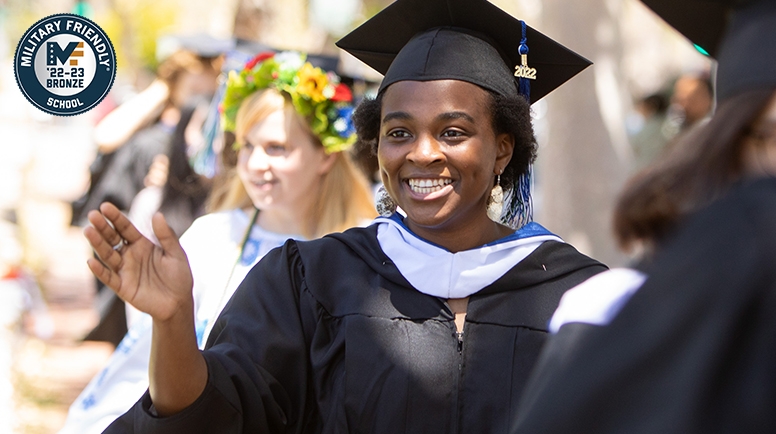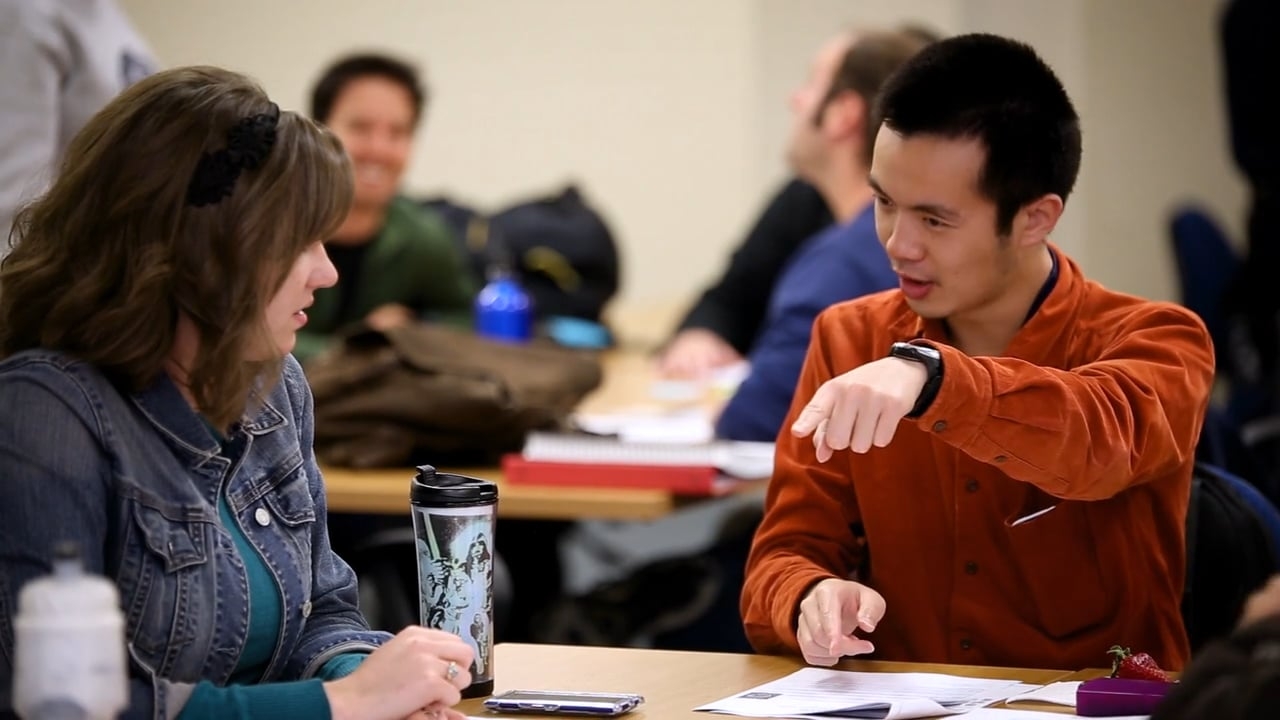Military Friendly: MA in TESOL | MA in Teaching Foreign Language

Advance your career in language education. Our participation in the Yellow Ribbon Program and other military benefits makes your degree an affordable investment. Study online or in person.
Our Master of Arts in Teaching English to Speakers of Other Languages (TESOL) and Master of Arts in Teaching Foreign Language (TFL) give you advanced skills in language teaching pedagogy, theory, research, technology, and assessment that you can immediately apply to your work.
The online option for TESOL is part-time and asynchronous (no required live class meetings) for maximum flexibility.
Complete Your Degree in 12 Months
|
Start Term |
Credits |
Duration |
In Person |
Online |
|---|---|---|---|---|
| In person: Fall or spring Online: Summer |
TESOL: 40 TFL: 42 |
12–24 months | Monterey, California | Asynchronous |
Download the program guide below to get more details on the curriculum, tuition, military benefits, and career outcomes. You will also be connected with a personalized enrollment advisor.
DOWNLOAD THE TESOL and TFL PROGRAM GUIDE
Use Your Military Benefits
We offer full tuition coverage for qualifying veterans and their eligible dependents through the Post-9/11 GI Bill® and the Yellow Ribbon Program. We also offer preferential scholarship consideration to those who are not eligible for these benefits. We are committed to making your education affordable and helping you take this next important step in your career.
Learn more about military benefits.
Advance Your Career
Our alumni are thriving in careers as teachers, program directors, curriculum developers, assessment specialists, and teacher educators in the U.S. and around the world. Many of them were recruited by employers before they even completed the program. You’ll graduate with the capacity to take on many leadership roles in language education.
One Year After Graduation
A Multidisciplinary Approach to Language Education
The TESOL and TFL MA programs prepare language educators for teaching English as a second language and teaching foreign languages. The curriculum that we offer our students is one that integrates theory and practice and research. And so, all of our courses address all three.
Creating an environment where the students are all on the same page and providing more for visual learners.
We’re teaching for the student who’s having the hardest time. Right, so if you. >> I wanted to pair linguistics with teaching and MIIS really did a good balance these two things. It’s not just teaching and it’s not just linguistics, it has this balance of theory and practice.
We give our students lots of opportunities to do real life projects out in the community that are the same kinds of work they’ll be doing once they graduate.
We have an on-campus student organization called BUILD, which allows students to take lower level language classes that are taught by volunteer student teachers here at MIIS. So a lot of the student teachers are people in my program in Teaching a Foreign Language, or Teaching English as a Second Language. I was able to apply what I’ve learned in my classes, and experiment with different methods and trial and use things when I teach BUILD.
I currently work, down in Custom Language Services, which has this English For Diplomats program and so, lot’s of different things I’m learning in the classroom I can take and try on and see if it works. I didn’t have a lot of teaching experience, and through the program I able to problematize a lot of different things that you go into the classroom with.
And then actually go into a classroom and try to teach these things.
Our students work with real clients out there who need help in developing curriculum for their programs. We’ve had ongoing groups of students go every year to work with a group of Haitian teachers of English, where they’re working with them on developing not only their English language skills, but their pedagogical skills for teaching English in Haiti. There’s a real commitment to quality teaching, and, as faculty members, we get to put that into practice every single day and be mentors for our students.
Giving the students a chance, more than one student a chance, to give definitions, I think would be a good idea.
So the professors in the TESOL program are, their door is always open. Whether they are in office hours or not, they welcome you to come in, and they encourage you to come in, even if it’s not for their class. They can help you with your linguistics, they can help you with your teaching, your grammar, whatever class you’re in, they can try to offer help or they can send you in the right direction.
It’s always exciting to see what our students do when they finish their MA degrees, when they go out into the field. We have students who have done really critically important works. We have students who are contributing to curriculum development and really expanding the notion of language teaching across many different settings. They go on to do a lot of different things and very exciting things.
I recently got a job offer teaching Chinese at a high school level in Austin, Texas. I’ll be using everything I’ve learned in my degree program, and I just feel like right now I’m so much more prepared in terms of my academic training and also pedagogical training.
You’ve got lots of different resources around to help you. You’ve got alumni that, as you step on the campus, are ready to help you even though they don’t know you. You’ve got on-campus help with advising, teachers, faculty. And then you have a whole support of your colleagues. These networks of people that are here to help you. So, I think, you step on to a campus where it’s just a built-in community right from the start.
Curriculum
Build your expertise in these areas:
- Linguistics
- Pedagogy
- Research and assessment
- Teaching in-person and online students
- Integrating language teaching technology
What Our Alumni Have to Say
Active duty military, veterans, and their dependents make up more than 5 percent of our students, so there’s a strong sense of community here.

LaTesha Charbonnet Gonzales
Current Employment: Director, Intensive English Program, University of New Orleans (New Orleans, Louisiana)
Institute Advantage: Working with Professor Kathi Bailey as an editorial assistant [helped me launch my career].

